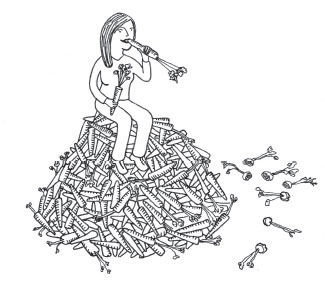


A lyttle house well fylled,
a lytle ground well tylled and
a little wife well wylled
is best
(1545)
Pundits talk of the global village, but the world is still a huge and deeply varied place, offering any number of environments for people to settle in:
Periscii (1625) the inhabitants of the polar circles, so called because in summer their shadows form an oval
Ascians (1635) inhabitants of the Tropics, who twice a year have the sun directly overhead at noon (hence ‘without shadows’)
antiscian (1842) a person who lives on the opposite side of the Equator
epirot (1660) a person who lives inland
paralian (1664) a person who lives near the sea
owd standards (Lincolnshire) old folk who have lived in a village all their lives
carrot cruncher (UK slang) a person from the country, a rural dweller

Countryside, town or something in between, take your pick:
agroville (1960) a community, a village stronghold (relating to South Vietnam)
tenderloin district (1887) the area of a city devoted to pleasure and entertainment, typically containing restaurants, theatres, gambling houses and brothels
huburb (US slang) its own little city within another city
Local features may add to or subtract from the desirability of one’s residence:
hippo’s tooth (US slang) a cement bollard
witches’ knickers (Irish slang) shopping bags caught in trees, flapping in the wind
urbeach (US slang) an urban beach generally built along a riverbank
generica (US slang) features of the American landscape (strip malls, motel chains, prefab housing) that are exactly the same no matter where one is
packman’s puzzle (Wales) a street or housing estate where the house numbers are allocated in a complicated fashion which causes problems to visitors, tradesmen etc.
If you stay too long in one place you might saddle your children with a nickname they never asked for:
beanbelly (17C) a native of Leicestershire (a major producer of beans)
malt-horse (17C) a native of Bedford (from the high-quality malt extracted from Bedfordshire barley)
yellow belly (18C) a native of Lincolnshire (especially of the southern or fenland part where the yellow-stomached frog abounds)
It’s generally wisest to try and meet the neighbours before you actually move in; though the horrid truth is that the people next door can change at any time:
baching (New Zealand 1936) living usually apart from a family and without domestic help, ‘doing for oneself’ (especially of a male)
scurryfunge (coastal American 1975) a hasty tidying of the house between the time you see a neighbour and the time she knocks on the door
exhibition meal (Hobo slang) a handout eaten on the doorstep: the madam wants the neighbours to witness her generosity
flying pasty (c.1790) excrement wrapped in paper that is thrown over a neighbour’s wall
to have the key of the street (b.1881) of a person who has no house to go to at night, or is shut out from his own
Once you’ve settled in, though, you’re free to make what you like of the rooms…
piggery (UK college slang early 20C) a room in which one does just as one wishes and which is rarely cleaned
chambradeese (Scotland) the best bedroom
ruelle (Tudor–Stuart) the space in a bedroom between the bed and the wall
but and ben (Geordie) outside and inside (refers to a two-roomed house with an outer and inner room)
though you’re all too likely to become swamped in the details of domesticity:
flisk (Gloucestershire) a brush to remove cobwebs
izels (Lincolnshire) particles of soot floating about in a room, indicating that the chimney needs to be swept
beggar’s velvet (1847) downy particles which accumulate under furniture from the negligence of housemaids
winter-hedge (Yorkshire 18C) a clothes-horse (from the way a full clothes-horse ‘hedged off’ a portion of a room: summer washing was dried out of doors)
wemble (Lincolnshire) to invert a basin or saucepan on a shelf so that dust does not settle on the inside
poss (Shropshire) to splash up and down in the water, as washerwomen do when rinsing their clothes
just make sure you don’t take it so far that that you upset your cohabitants…
spannel (Sussex) to make dirty foot marks on a clean floor
heel (Gloucestershire) to upset a bucket
spang (Lincolnshire) to shut a door by flicking the handle sharply so that it slams without being held
With the place spick and span, perhaps it’s time to throw that party:
tin-kettling (New Zealand 1874) a house-warming custom whereby a newly wed couple were welcomed by friends and neighbours circling the marriage home banging on kerosene tins until provided with refreshments
cuddle puddle (New York slang 2002) a heap of exhausted ravers
buff-ball (1880) a party where everyone dances naked

A well-known proverb says that fish and guests go off after three nights, so if you ask people to stay for longer, make sure you have some way of getting rid of them if need be:
thwertnick (Old English law) entertaining a sheriff for three nights
agenhina (Saxon law) a guest at an inn who, after having stayed for three nights, was considered one of the family
sit eggs (US black slang 1970s) to overstay one’s welcome (from the image of a hen awaiting her chicks)
Because, in the end, what could be nicer than closing the front door to all outsiders and taking the relaxing ablution of your choice:
offald (Yorkshire) tired and dirty, in need of a bath
muck-rawk (Yorkshire) a dirty line (e.g. on neck) showing the limit of where it has been washed
cowboy (US slang) a quick bath using little water (since cowboys bathed sparingly)
psychrolutist (1872) one who bathes in the open air daily throughout the winter
Before sinking into a well-deserved rest, wherever in the house the fancy takes you:
nid-nod (1787) to nod off
counting rivets (Royal Navy jargon) going to sleep: it refers to lying down and looking at the rivets above the bunk
hypnopompic (1901) the fuzzy state between being awake and asleep
to sleep in puppy’s parlour (Newfoundland 1771) to sleep on the floor in one’s clothes
bodkin (1638) a person wedged in between two others when there is proper room for two only (a bodkin was a small sharp dagger)
admiral’s watch (underworld slang 1905) a good night’s sleep, especially at night
to drive one’s pigs to market (US 19C) to snore